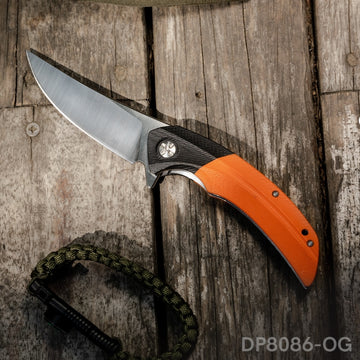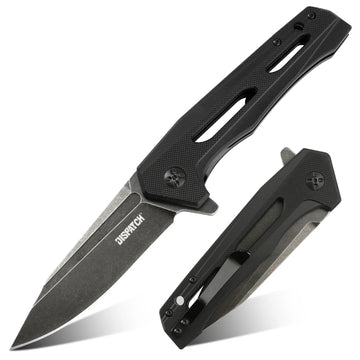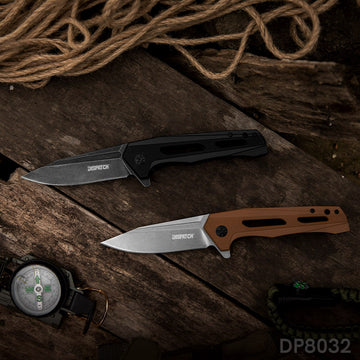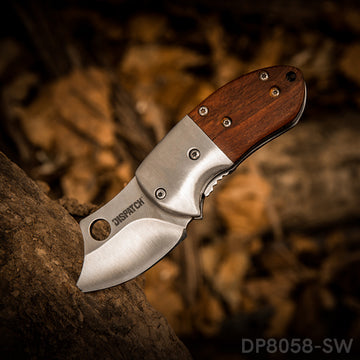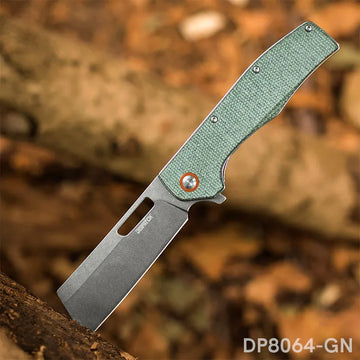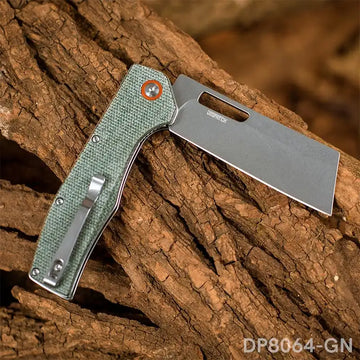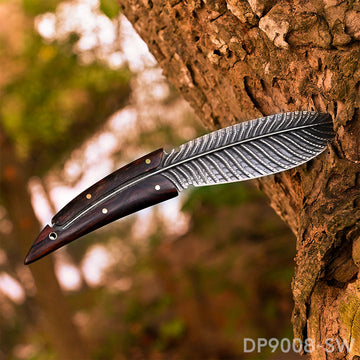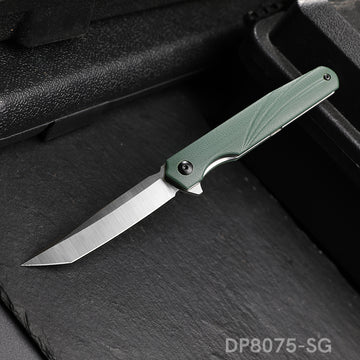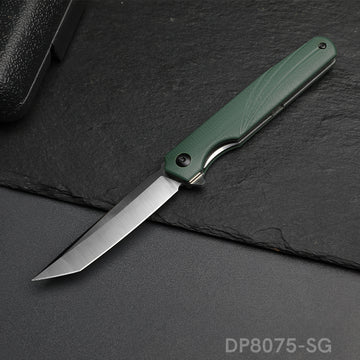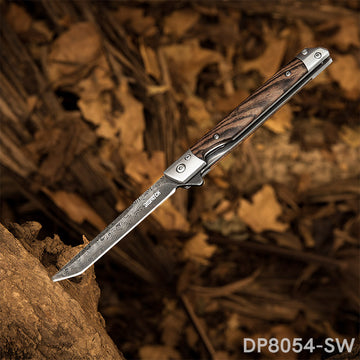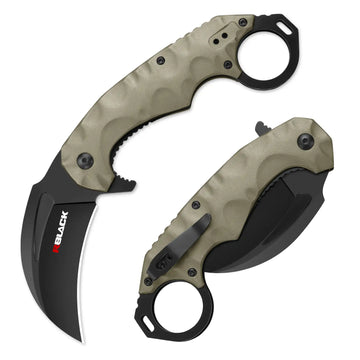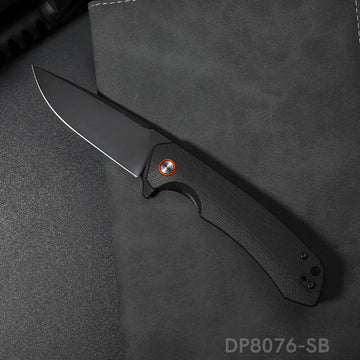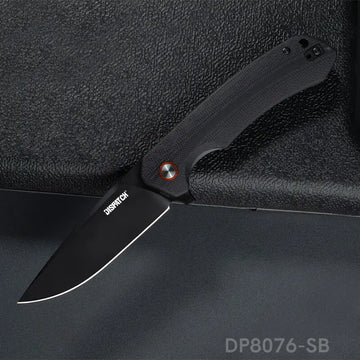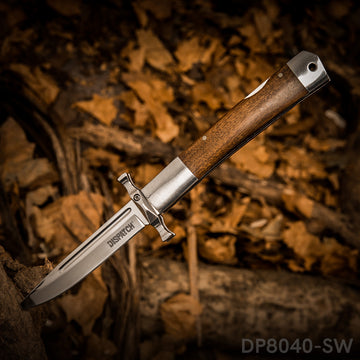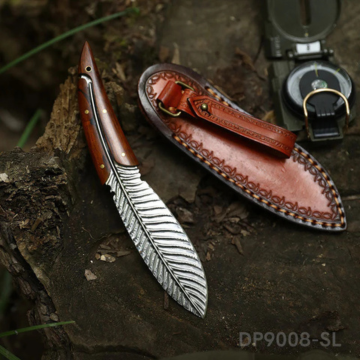10+ Most Common Knife Blade Types You Should Know
The type and shape of your pocket knife blade depends on what you are using the knife for. There are dozens of different blade types out there available. Some were developed for specific tasks, while others are for more general use. Most blade shapes also include modified versions. For this article, we wanted to show some of the most common blade shapes and explain what they’re used for.
Here is a List of the most common Knife Blade Types and Shapes you will encounter:
- STRAIGHT BACK
- CLIP POINT
- TANTO POINT
- DROP POINT
- SHEEPSFOOT
- WARNCLIFFE
- SPEAR POINT
- TRAILING POINT
- HAWKBILL
- GUT HOOK
STRAIGHT BACK KNIFE

The normal (or straight-back) blade is pretty straightforward with a dull flat back and a curved edge. Because the back of the blade doesn’t have a sharp edge, it allows you to use your hand or fingers to apply additional pressure to make cutting easier.
Uses: The straight back pocket knife is mostly used for cutting and chopping purposes. It is the most frequently found on fixed blade knives and kitchen knives.
See examples of clip point knives>>
CLIP POINT KNIFE

A clip point blade is one of the most popular blade shapes in use today.It is formed when you take a normal blade and ‘clip’ the back which results in a thinner tip. A Bowie knife is a classic example of a knife with a clip-point blade.
Uses: Clip point blades are ideal for hunting, the outdoors, and everyday carry as they work great on any task that requires absolute precision.
See more examples of clip point knives>>
TANTO POINT BLADE KNIFE

The tanto knife has a chisel edge inspired by Japanese Samurai sword which provides excellent strength. Tanto knives have no belly so will not be able to slice, but that durable tip and generally robust point make it good for penetrating almost anything.
Uses: The Tanto Point knife blade is a tantalizing choice for any tactical task! It’s a great blade if you’re looking to pierce tough objects, but otherwise, this probably shouldn’t be part of your EDC.
You’ll find some different varieties of tanto blades and they are becoming quite popular in certain tactical knives.
See examples of tanto knives>>
DROP POINT KNIFE

The drop point blade is easy to identify by a convex spine that curves down from the handle to the point. Many variations of drop-point blade can be found to make these knives a fit for just about anyone.
Uses: drop point blades are versatile and useful for just about everything.They can be used for many different tasks, and are frequently used as hunting knives, outdoor knives and everyday carry.
You’ll find many modern pocket knives today having drop point blades as it’s effective in most applications.
See more examples of drop point knives>>
SHEEPSFOOT KNIFE

The sheepsfoot blade Features a straight edge and a dull back which is largely straight then curves at the end. Sheepsfoot blades are designed for slicing while minimizing the potential for accidental piercing with the point. These knives can be closely controlled by your fingers being placed on the dull back and were originally used for trimming the hooves of sheep.
Uses: Great for any sawing, chopping, or cutting applications where penetration of the tip is to be avoided. See examples of sheepsfoot knives >>
WARNCLIFFE KNIFE

The Wharncliffe blade is very similar to the sheepsfoot, but the back begins to curve towards the tip much earlier and therefore at a more slight angle. The shape is similarly ideal for slicing while minimizing the possibility for an accidental puncture with the tip.
Use: Filleting, food preparation, general usage, etc. This blade shape is especially useful for opening boxes or as a letter opener.
SPEAR BLADE

The spear point knife is a symmetrical blade shape with a long cutting edge that also excels at piercing to pierce. You’ll typically find the spear-point blade in throwing knives or daggers. Many spear-point knives are daggers and classified as weapons, which makes them illegal in many places.
Use: Long deadly blades meant for combat and self-defense. Commonly used as decorative showpieces.
See more examples of spear point knives >>

TRAILING POINT BLADE

The trailing-point blade has a distinctive back edge that curves up which allows for improved slicing ability. The curve allows for a more lightweight knife as compared to the normal blade. This blade style is popular on filet and skinning knives for hunters.
Uses: Trailing blade with a larger belly often used for all slicing and skinning. Trailing-point blade knives are mostly used by hunters.
See examples of trailing point knives>>
HAWKBILL BLADES

The hawkbill blade(also talon blade) has both the back and the edge of the blade follow a similar arcing slope and come to a fairly drastic curved point. So, This blade type is seen most commonly in knives used for combat, like the tactical karambit seen here.
Uses: the hawkbill blade is the best option for cutting cords and stripping wires, or even pruning trees. It is also the shape for karambit knives.
See examples of clip point knives>>
GUT HOOK

Technically, a gut hook is more of a feature included on a blade. It usually appears as a small, sharpened hook-like curve on the spine near the point situated towards the handle. The design of the hook allows hunters to open the insides of an animal without damaging muscle.
Use: A gut hook knife is used almost exclusively by hunters and fishermen for field dressing or quickly cutting line.

